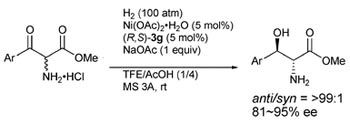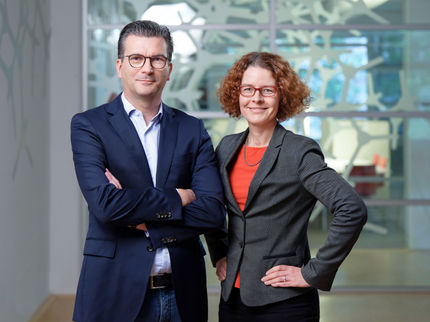Transition to sustainable catalysis
Japanese scientists have discovered a cheap and enantioselective catalyst for asymmetric hydrogenation reactions
Advertisement
Yasumasa Hamada and colleagues at Chiba University used a combination of nickel acetate and a commercially available phosphine ligand to catalyse the asymmetric hydrogenation of an alpha-amino-beta-keto ester hydrochloride. Although others have reported similar reactions, Hamada says this is the first time that a homogeneous chiral nickel catalyst has been used.

Precious metals, such as rhodium, iridium and ruthenium, play a crucial role as the central metal of homogeneous catalysts for asymmetric hydrogenation reactions. However, these metals are expensive and are becoming increasingly rare as we use up the natural resources. Hamada says he was motivated to find sustainable methods using abundant and cheap transition metals, such as nickel. 'Although the activity of the nickel catalyst is moderate at present, it is expected that the processes catalysed by precious transition metal complexes will be replaced by base transition metals in the near future,' he says.
Hamada plans to focus on finding more active nickel complexes, although he admits it won't be easy. 'Research using transition metal complexes is confronted with difficulty because there is no proper ligand giving high reactivity and selectivity,' he explains. 'The development of new ligands and counter-ions will provide the solution to this long standing problem.'
Original publication: Yasumasa Hamada et al., Chem. Commun., 2008.
Most read news
Topics
Organizations
Other news from the department science

Get the chemical industry in your inbox
By submitting this form you agree that LUMITOS AG will send you the newsletter(s) selected above by email. Your data will not be passed on to third parties. Your data will be stored and processed in accordance with our data protection regulations. LUMITOS may contact you by email for the purpose of advertising or market and opinion surveys. You can revoke your consent at any time without giving reasons to LUMITOS AG, Ernst-Augustin-Str. 2, 12489 Berlin, Germany or by e-mail at revoke@lumitos.com with effect for the future. In addition, each email contains a link to unsubscribe from the corresponding newsletter.




























































